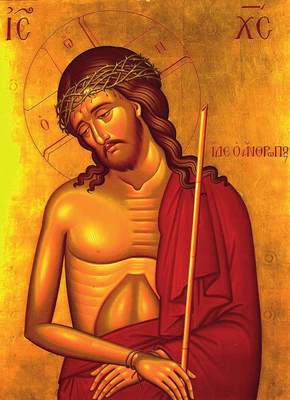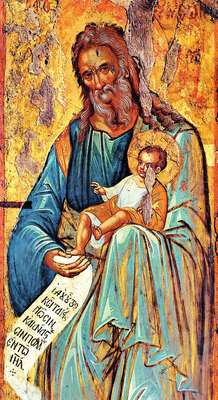The fourth spiritual evening of the Exploring Your Faith! program took place on February 18, 2021, online, this time on the YouTube channel of St. Nicholas Orthodox Church, Woodside, New York.
The theme of the spiritual evening continued the presentation of the Holy Prophet Isaiah’s prophecies, focusing on the Poems of the Servant of the Lord: Ebed Yahweh, which are four astounding passages from the prophet’s book (42.1–4; 49.1–6; 50.4–9; 52.13–53.12).

The term servant (Hebrew: עֶבֶד, ebed) has as its primary meaning the idea of master’s worker, then that of another’s property, and by extension, the sense found in the Scripture as well, that of voluntary obeyer (to a person, people, deities). But a more comprehensive definition of the term is found in the very words of the Savior: “And which of you, having a servant plowing or tending sheep, will say to him when he has come from the field: ‘Come at once and sit down to eat?’ But will he not rather say to him: ‘Prepare something for my supper, and gird yourself and serve me till I have eaten and drunk, and afterward you will eat and drink?’ Does he thank that servant because he did the things that were commanded him? I think not. So likewise you, when you have have done all those things which you are commanded, say, ‘We are unprofitable servants. We have done what was our duty to do’” (Luke 17.7–10). In these verses the Savior fully explains what it means to be a slave, the true ethos of a servant, who, despite working hard for his master, is still not entitled to ask for anything. Only with this recipe presented to the apostles can pride be avoided, while unceasing work, spiritual freshness, and faith can be preserved.
The poems of the Servant outline and strengthen the aforementioned words, building the portrait of the Servant of the Lord. Ebed Yahweh is a phrase that appears in the poems and signifies a Person not explicitly identified, but who holds clearly messianic characteristics. In the Jewish tradition it was considered that the four poems speak of the same Person: “In my opinion the expression My Servant (52.13; 53.11) denotes the same person who is the subject in the other passages (42.1; 49.3; 50.6), and the mystery lies, as I intuited, in the middle of the book (chapter 40), so that all these parashah [distinct units or sections] are closely linked together” (Ibn Ezra).
~
Poem I (42.1–4)
- “Jacob is My Servant; I will help Him;
Israel is My chosen; My soul accepts Him.
I put My Spirit upon Him;
He will bring forth judgment to the Gentiles.
- He will not cry out, nor raise His voice,
Nor cause His voice to be heard outside.
- A bruised reed He will not break,
And smoking flax He will not quench;
But He will bring forth judgment in truth.
- He will shine forth and not be broken
Until He establishes judgment in the earth;
And in His name the Gentiles will hope.”
The words “A bruised reed He will not break, and smoking flax He will not quench” outline very expressively the form of the Savior and His relationship with repentant sinners. He neither rejected nor terrified anyone.
~
Poem II (49.1–6)
- “Listen to Me, O coastlands,
And take heed, you Gentiles.
It will stand for a long time,” says the Lord.
“He called My name from My mother’s womb.
- He made My mouth like a sharp sword,
And hid me under the shadow of His hand.
He made Me as a chosen arrow
And covered Me in His quiver.
- He said to Me:
‘You are My servant, O Israel,
In whom I will be glorified.’
- Then I said, ‘I have labored in vain
And spent My strength for nothing.
Therefore My judgment is from the Lord
And my labor is before My God.’
- Now thus says the Lord,
Who formed Me from the womb to be His Servant,
- Indeed He says,
‘It is a great thing for You to be called My Servant
To establish the tribes of Jacob,
And to restore the dispersion of Israel.
Behold, I give You as the covenant of a race
And as the light of the Gentiles,
That You should be
The salvation to the ends of the earth.
The second poem combines the words of the Servant with those of God. The construction “I have labored in vain and spent My strength for nothing” can be related to the words of the Savior on the way to His Passion, “O Jerusalem, Jerusalem, (…) How often I wanted to gather your children together, as a hen gathers her chicks under her wings, but you were not willing” (Matthew 23.37). The beautiful ending of the poem reminds of His words “I am the Light of the world” (John 8.12), as well. In addition, the term salvation refers to the very name of the Messiah, (Ieshua, יֵשׁוּעַ) Yahve— the Salvation of God, Jesus of God.
~
Poem III (50.4–9)
- The Lord God gives Me the tongue of the learned
So as to know when to speak a word at a fitting time;
And He causes My ear to listen each morning.
- The Lord’s instruction opens My ears,
And I am not disobedient
Nor do I contradict Him.
- I gave My back to whips,
And My cheeks to blows;
And I turned not away from the shame of spitting.
- The Lord became my helper;
Therefore, I was not disgraced.
But I made My face like a solid rock,
And knew I would not be ashamed.
- For He who pronounces Me righteous draws near.
Who is he who judges Me?
Let him oppose Me at the same time.
Who is he who judges Me?
Let him come near Me.
- Behold, the Lord will help Me.
Who will harm Me?
Behold, all of you will grow old like a garment,
And old age will devour you,
As a moth does a garment.
This poem underscores primarily the self-emptying, the passion of the Savior. If the first two poems speak more of His Glory, the sacrifice is marked here, in the third one. His two hypostases—glory and self-emptying—can be seen again. At the same time, the accent falls on His obedience to the Father, mentioned later in the Holy Gospel: “For I have come down from heaven, not to do My own will, but the will of Him who sent Me” (John 6.38) or “Nevertheless not My will, but Yours, be done” (Luke 22.42).
~
Poem IV (52.13–53.12)
- Behold, My Servant shall have wisdom,
And He shall be exalted and glorified exceedingly.
- Just as many shall be astonished at You,
So Your form and glory shall be dishonored by men.
- Thus many nations shall marvel at Him,
And kings shall shut their mouth,
Because they to whom no report was brought concerning Him shall see;
And they who did not hear shall understand.
- O Lord, who has believed our report,
And to whom was the arm of the Lord revealed?
- We proclaimed His presence as a Child,
As a Root in a thirsty land.
He had no form or glory,
And we saw Him;
And He had no form or beauty.
- But in comparison to all men,
His form was lacking in honor.
He was a man in suffering,
And knew how to bear sickness.
His face was turned away,
And He was dishonored and not esteemed.
- He bears our sins and suffers for us,
Yet we considered Him to be
In pain, suffering, and ill-treatment.
- But He was wounded because of our lawlessness,
And became sick because of our sins.
The chastisement of our peace was upon Him,
And by His bruises we are healed.
- All we like sheep have gone astray.
Man has gone astray in his way,
And the Lord delivered Him over for our sins.
- Although He was ill-treated,
He opened not His mouth.
He was led as a sheep to the slaughter,
And as a lamb is silent before his shearers,
So He opens not His mouth.
- In His humiliation His judgment was taken away,
And who will declare His generation?
For His life is taken from the earth,
And because of the lawlessness of My people
He was led to death.
- I will appoint evil men for His burial
And rich men for his death,
Because He committed no lawlessness,
Nor was deceit found in His mouth.
- The Lord wishes to cleanse Him of His wound,
And if You give an offering for sin,
Your soul shall see a long-lived seed.
- The Lord wishes to take away the pain of His soul,
To show Him light,
To form Him with understanding,
And to pronounce righteous the Righteous One
Who serves many well;
And He shall bear their sins.
- Therefore He shall inherit many,
And will divide the spoil with the strong,
Because His soul was delivered over to death.
He was considered among the lawless,
And He bore the sins of many,
And was delivered over
Because of their sins.
This poem presents almost photographically the passion of the Savior.
~
The poems of the Servant depict a relationship between the Servant and Yahweh above any other relationship of Yahweh expressed in history. It also shows a portrait of the Servant, impossible to replicate or fulfill outside of the God-Man Jesus Christ: chosen Servant, helped and accepted by Yahweh, bearer of the Spirit of Yahweh, called from the womb, called from birth, sword and arrow of Yahweh, Israel in which Yahweh will be glorified, light of the Gentiles, salvation to the ends of the earth, obedient disciple, fulfilling all unto the death. There is nothing reproachable about Him.
The Savior Christ was Yahweh’s only perfect Servant who fulfilled God’s will and work perfectly unto death. We are all called to follow Him and thus be true servants of Yahweh.

16th century, Crete
In conclusion, because this month we celebrated the Meeting of the Lord at the Temple in Jerusalem, it is meet and right to note that the Righteous Simeon, filled with prophetic spirit, upon receiving the Child Jesus in his arms, sang a hymn that is closely related to the second poem of the Servant:
“Lord, now You are letting Your servant depart in peace, according to Your word; for my eyes have seen Your salvation which You have prepared before the face of all peoples, a light to bring revelation to the Gentiles, and the glory of Your people Israel” (Luke 2.29–32).
“Behold, I give You as the covenant of a race and as the light of the Gentiles, that You should be the salvation to the ends of the earth” (Isaiah 49.6).
